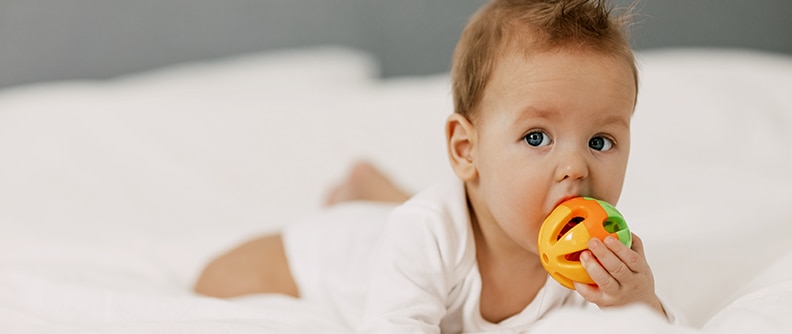New parents have lots of questions about taking care of their babies. They might be about how to begin bottle feeding, what to consider when choosing toys, or when to start tummy time. We have your answers here.
Choosing safe toys
As babies grow more active, they show more interest in the world around them. Toys can help stimulate their development. However, it’s important to choose safe ones. Follow these tips:
- Check all toys, including stuffed animals, for loose parts that could cause choking if swallowed.
- Remove ribbons or strings that could cause strangulation.
- Avoid toys with sharp or pointy edges.
- Never allow your baby to play with plastic bags or balloons.
- Choose toys made with nontoxic paints and dyes.
- Read product labels and pick toys for your baby’s age group.
- Make sure electric toys are labeled "UL Approved."
- Test all rattles, squeeze toys, and teethers to make sure they can’t come apart.
The American Academy of Pediatrics encourages parents to limit video games and other media when children are very small. Use caution when you see such products labeled as “educational.” Many of these products really aren’t. For children 18 to 24 months, it’s best to watch with them. Kids over 2 years old should have less than an hour of screen time per day. Designate media-free hours when family members can be together without being distracted by devices.
You might also consider a toy’s potential for promoting gender-based stereotypes. As society’s expectations of what is appropriate for boys and girls change, so do the toys.
Tummy time pointers
Tummy time is very important for your baby’s development. This activity strengthens their neck and arm muscles. You should place your baby on their stomach for a few minutes 2 to 3 times a day, increasing the amount of time as the baby shows they are enjoying the activity. A great time to do this is following a diaper change or when the baby wakes up from a nap. Always keep an eye on them.
It’s natural for babies to be frustrated with tummy time at first. Try propping your baby up with a rolled-up towel or nursing pillow under their chest. Get down on the floor with them or place a toy within easy reach for them to play with. Eventually your baby will enjoy tummy time.
Tummy time prepares babies for the time when they will be able to slide on their bellies and crawl. As babies grow older and stronger, they will need more time on their tummies to build their own strength.
Avoiding flat spots on the baby’s head
Parents and caregivers often worry about the baby developing a flat spot on the back of the head because of sleeping on their back. Though it is possible for a baby to develop a flat spot on the head, it usually rounds out as they grow older and sit up.
There are ways to reduce the risk of the baby developing a flat spot. Try alternating which end of the crib you place the baby's feet. This will cause them to naturally turn toward light or objects in different positions, which will lessen the pressure on one particular spot on their head. When putting your baby down to sleep, try turning their head so that they’re on a different side each time.
When your baby is awake, vary their position. Limit time spent in freestanding swings, bouncy chairs, and car seats. These items all put added pressure on the back of the baby's head.
Spend time holding your baby in your arms as well as watching them play on the floor, both on their tummy and on their back.
Changing diapers
For a dirty diaper, be sure to wipe from the front to the back. This is important to avoid spreading bacteria from poop, especially into the vagina or bladder. Covering the penis with a cloth can prevent getting sprayed if your baby pees while being changed.
Your baby’s skin can be sensitive, especially in the first few months of life, so warm water on a cloth or cotton ball is often the best way to clean your baby without irritating their skin. You can also use baby wipes—look for those that are 99% water. Other types of wipes, especially if they contain alcohol, may cause rashes and other irritation.
The best way to avoid diaper rash is to change your baby as soon as you realize their diaper is wet or dirty. It is always important to clean your baby’s bottom after they have pooped. If your baby has only peed, it is important to change them, but you may not need to wipe.
Why your baby’s breasts may look swollen
All babies have breast tissue that will grow when stimulated by the hormones estrogen and progesterone. Babies can be born with swollen breasts because some of their parent’s hormones are transferred to the baby’s blood through the placenta.
This breast tissue can also produce small amounts of milk, which is the white fluid that can come from the nipples of some babies. The amount of maternal hormones in a baby’s blood is different for each baby, so not all babies have swollen breasts or produce milk.
The maternal hormones will eventually clear from your baby’s blood and any swelling usually disappears within a couple of weeks.
